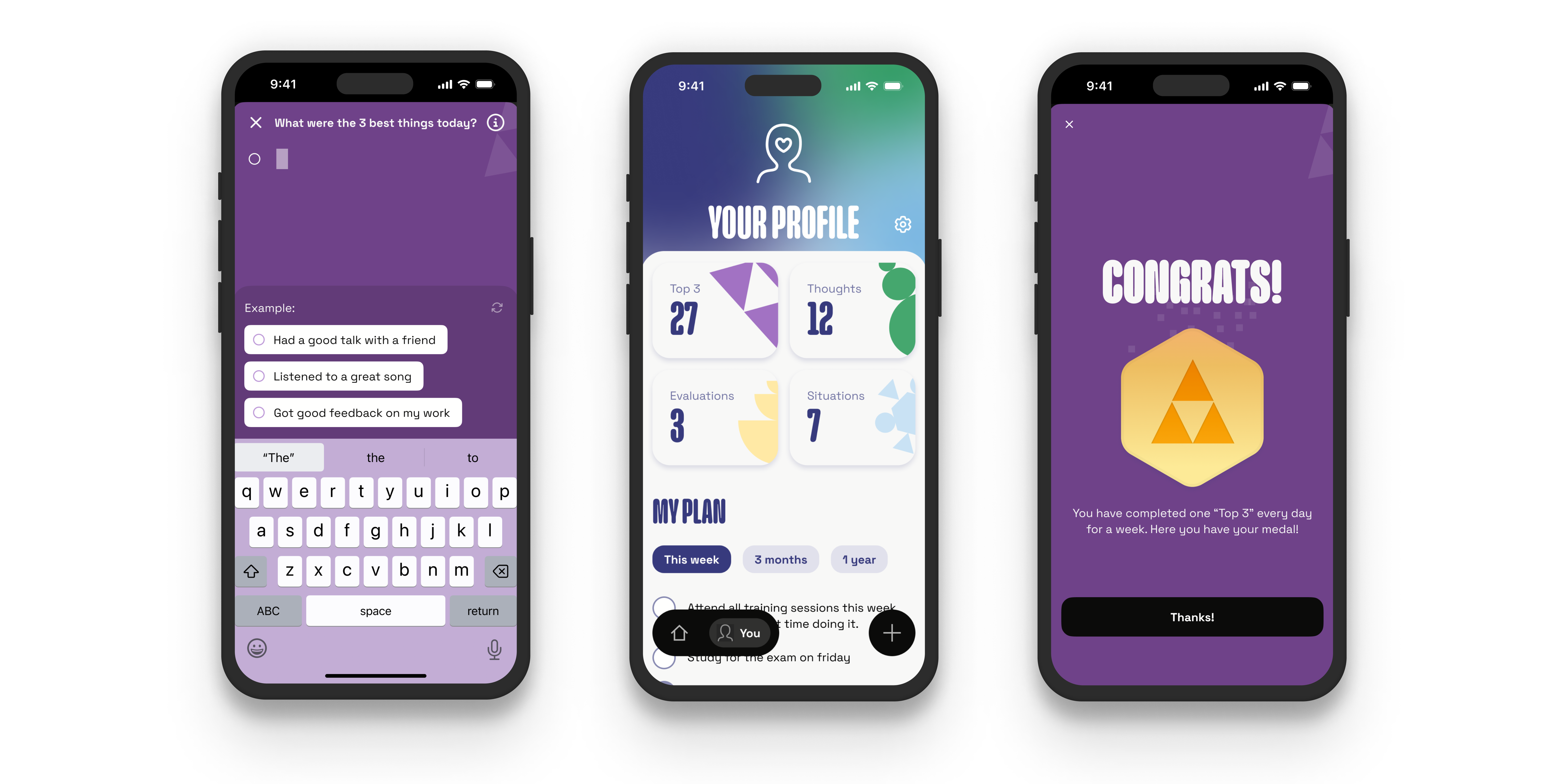PlayWellMinds
Mental training for teenagers
Today’s youth face many challenges that can impact their mental well-being. In response, PlayWellMinds, in collaboration with Prototyp, has developed an app to help young people build mental strength and learn how to manage challenges − both in sports and everyday life.
In Brief
- An app for iOS and Android.
- A seven-step program for young people to work on their mental strength and self-awareness.
Tech stack
Flutter• Firebase• Rive
Sustainable development goals
Case Video
The Team
Viktor Lemon
Tech lead/Developer, Prototyp
Lucia Dabezies
Tech lead/Developer, Prototyp
Henrik Cronebäck
Founder, PlayWellMinds
Daniel Felt
Product Design & UI, Great Scott
Background
Idea sparked by Norwegian book
As a young football player, Henrik Cronebäck wanted to learn more about mental development and performance. He discovered the book Bäst när det gäller (Best When It Counts) by Norwegian sports psychologist Willi Railo, which had a profound impact on him.
“That book has helped me throughout my life. I wanted to pass on that feeling to my 12-year-old kids and their team I coached in floorball,” says Henrik Cronebäck.
He updated his knowledge with other books on similar themes and then wrote a seven-step development program for his floorball team, using pen and paper.
However, he sought a solution better suited to today’s young athletes. By fall 2023, he realized that the available options were limited and decided to take matters into his own hands.
“I was inspired by the language app Duolingo and thought I could use similar gamification and positive energy in an app to engage kids and teens,” / Henrik Cronebäck
The process
Playful and research-based
In collaboration with Prototyp, development began, and two independent psychologists were brought in to verify the method based on sports and youth psychology principles.
Prototyp’s developers chose Flutter, a cross-platform framework, for the app. This decision allowed the app to reach both iOS and Android users with a single codebase, without compromising user experience or performance.
The agency GreatScott handled product design and UI. The app incorporates gamification elements, including rewards, badges, and engaging animations, to encourage and motivate users to complete the program steps. Rive was used for the animations.
Thanks to thoughtful technical choices and a focus on core functionality, the team delivered a minimum viable product (MVP) for user testing in just three months.
“Building iteratively and delivering something to validate your idea early is crucial for us. It’s part of what we do at Prototyp. We aim to build the right thing for the purpose, adapting it continuously based on feedback.” / Viktor Lemon, Tech Lead and Developer at Prototyp.
The result
Mental training in high demand
The app is now available for download on both the App Store and Google Play Store. It integrates PlayWellMinds’ seven-step program into an interactive, digital experience, enabling youth to practice the exercises anytime.
“There’s a significant need for this, and we’ve noticed that kids enjoy using their phones. Everything is based on research and established therapeutic methods. If you develop the habit of doing the exercises daily, it can be incredibly powerful” / Henrik Cronebäck
In spring 2024, a pilot program was launched with 110 youths in schools and sports teams, including tennis, floorball and football. Seven lectures were combined with the app’s exercises.
“The feedback was overwhelmingly positive,” says Cronebäck.
The focus is on self-assessing emotions and experiences related to school, friends, sports, and performance.
“It’s a way to learn to manage thoughts and emotions – whether feeling disappointed, proud, sad, rejected, or anything else. For instance, users list three good things that happened during the day and reflect on how they handled challenging situations.” / Henrik Cronebäck
 Ett urval av skärmar i appen.
Ett urval av skärmar i appen.
The next step
Ready for a global market
Following the successful pilot, the app now has 150 users, and Henrik Cronebäck is working on scaling up the operations through investor talks, translations, partnerships, and sales.
“The goal is to take this global.”
He sees the collaboration with Prototyp as invaluable.
“I was a very novice client, so I needed a partner who thought of everything, understood my needs and requirements, and could translate them into reality. Prototyp really nailed it.”
The future challenge will be refining gamification and service design, Cronebäck believes.
“We’re exploring how to create small surprises, rewards, and medals for app activities. Scaling up will also provide us with anonymized data that can help us develop additional gamification features. While the current target audience is teenagers, the idea is that they could continue using the service throughout their lives.” / Henrik Cronebäck
You can read more about it at PlayWellMind's website.
Get started with Proof of Concept
Are you considering a new concept or thinking of a new idea and want to know if it would work? We will help you.
We use cookies to give you a better experience when visiting our website. Read more about how we handle cookies